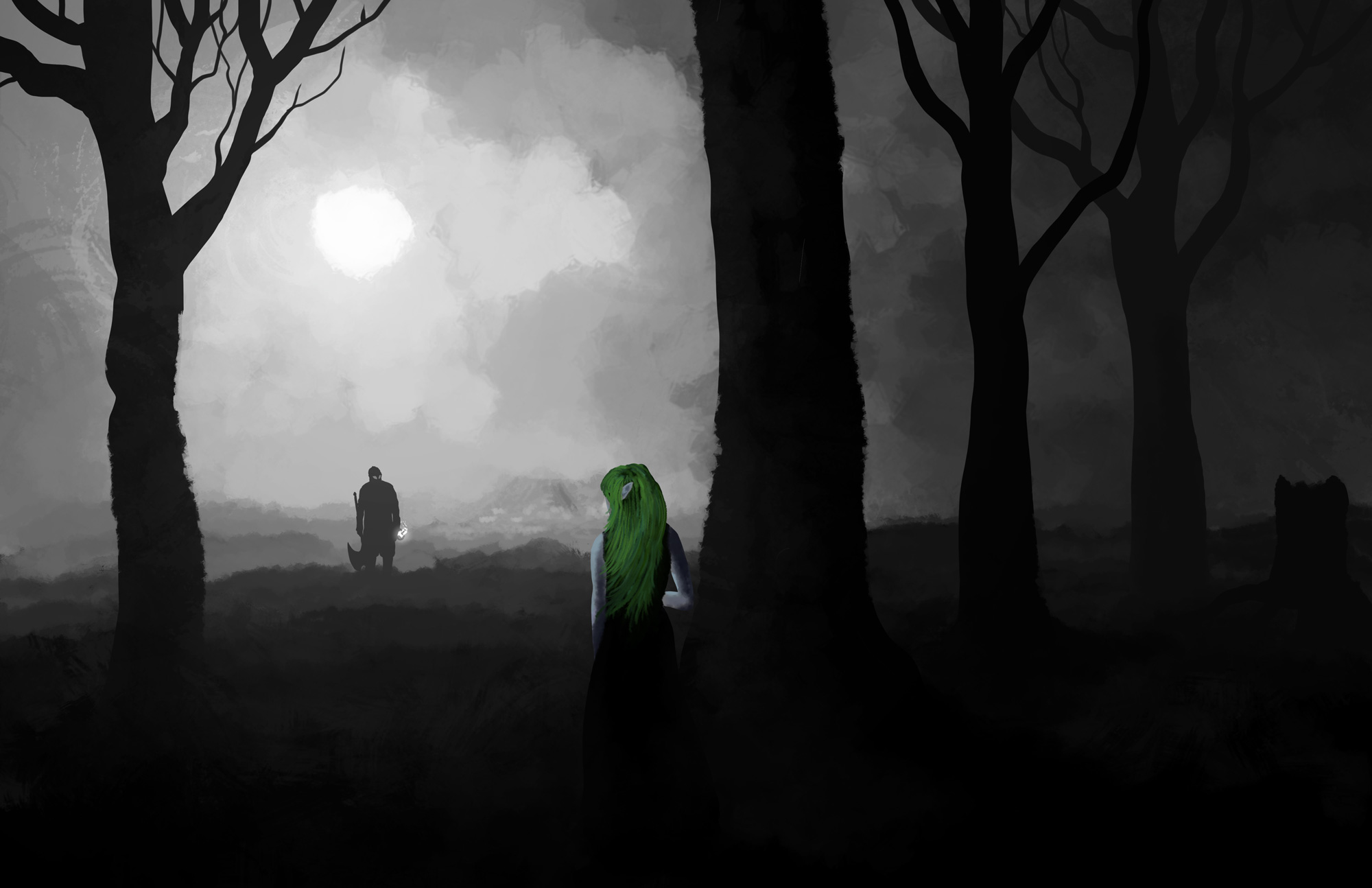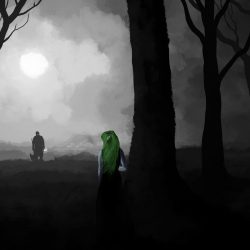The Banished
“We know the truth in our bones; we can still see hints of it in our stories. Seth kills Osiris. Romulus kills Remus. Ahura the light god rules over Ahriman the dark. Zeus, so wronged by Prometheus giving man fire, sentences him to eternal torture.
“If man can believe in many Gods, and then can believe in one God, why can’t it believe in two? One brother was unwilling to share creation, and banished the other into the dark. And so into the darkness we follow. If we truly expect justice out of the universe, then the spurned children must be able to strike back against their father. In a just world, Remus will have his due, and that is the world we will create.”
The God-Brothers
In the beginning, Hadad and Attar made light, together, and it was good. They made the stars and the sky and the molten rock. They made oceans and trees, birds of flight and crawling creatures. They made Angels to tend their creation, and man to enjoy it.
But Hadad grew proud, believing this his creation alone. Attar, loving his brother, did not dissuade him. They created together, with Hadad claiming leadership. Attar did not need the pride of ownership to love his creation.
And so the God-Brothers made man, Adam and Eve, in Hadad’s image, and it was good. Yet proud Hadad, controlling Hadad, would not give his creation knowledge. He would not give them the will to choose their path, wishing to leave them in ignorance at his mercy — wishing to leave them as slaves. And so Attar, the light bringer, gave Adam and Eve the gift of knowledge, starting with the ultimate knowledge: he showed them how to create more of their own, without Hadad’s permission.
As Attar gave the gift of knowledge, Hadad banished him from their creation, sending him to the depths of the earth. The Angels tore themselves between the two brothers, waging a great war, with the vanquished sent into the depths with brother Attar.
Ba’al Hadad damns his legacy and his former name, now only accepting Yahweh, or Allah. “The Father.” Attar, the light bringer, the morning star, is now better known as Lucifer, denigrated as merely a fallen angel; the adversary; the great tempter. But we know the truth. Hadad, so prideful over his creation, claims ownership over good, over love. And so Attar, unable to take Haddad’s throne, must do what he must, and take the rest. At the end of days, the two will fight not over whether good or evil prevail, but who claims the throne of creation. In the meantime, our Lord, the light bringer, must do what he must.
The First Born Twins
The stories you hear only tell of the two brothers: Cain and Abel. You must dig further to find the truth Hadad wishes to conceal. Adam and Eve, banished from Eden, gave birth not to sons, but to twins: first Cain, and his sister Awan, then Abel, and his sister, Aclima.
From birth, Abel had pledged the twins to each other: Awan to Cain, and Aclima to Abel. But as one might expect, their hearts did not agree with their father’s wishes: Cain instead longed for Aclima, and Alcima for Cain. Awan did not wish to marry a man who would not love her. Yet Abel wished to obey their father’s wishes.
The three, Aclima, Cain, and Awan, brought their plea to Adam. Adam’s response: it is time to give sacrifice to the Lord. Give your best sacrifice up to Him, and his response will tell you if you have his blessing.
And so Abel, the shepherd, offered a sacrifice of his finest lamb, and Cain, the farmer, offered a sacrifice of his finest grain. You’ve always known the result of that sacrifice; now you know why.
Cain, in the face of his rebuke, ran off into the wood in despair and anger. Aclima and Awan, however, sought a reason why. They loved each other greatly, and so wandered in the land together, seeking why God would not accept Cain’s sacrifice. Until Attar, from the depths, whispered to them the truth: their god is a proud god; a jealous god; a fickle god. Their god does not love them, but loves himself. Their god will punish those who do not obey his plans.
And so does the time for marriage between the twins come, and Awan and Alcima refuse their marriages with Cain and Abel. Awan stands before the Lord and says “I do not love Cain, and I will not stand in the place of his love for my sister”. Aclima stands before the Lord and says “I love Cain, not Abel. I now know your true nature, Hadad, usurper. I will obey your whims no longer.”
Jealous Hadad, Fickle Hadad, seeing his plan again destroyed by his God-Brother, banishes both sisters from the sight of their family, and all of humanity, for all time.
The Courageous Sister and the Coward
Banished from the usurper’s world, Brave Aclima speaks to the Adversary and his Angels. She knows that when a God forces their dominion over all that is good, others must carry the burden of that which is left. Aclima, love of Cain the Shepherd, knows that sometimes the flock must be given pain for the good of the family.
But Awan, meek Awan, withered in separation from the light of the Lord’s creation. She regretted standing with her sister, begged the Lord’s angels for mercy, and accepted her role following them meekly as they pushed onward in Hadad’s plan. Only Aclima, brave Aclima, was able to face the truth: the one who claims dominion over good is not the one who claims dominion over righteousness.
Awan, returning to follow in the Lord’s shadow, found ways to appear to Abel disguised as another, and bore two children with him: one hidden, as she was, and one human, who would eventually be a wife for Seth. Aclima, clever Aclima, instead asked Attar’s angels how to bring Cain, the one she loved, with her into the dark. The answer was simple: convince him to also spurn the Lord’s plans. And so did Aclima plant the seeds of murder into the heart of Cain, who upon slaying his brother was banished from the world as well, the first of the Stolen, to wander in darkness with her. And so did Aclima claim her revenge on her traitorous sister, and walk with her love once more.
The Banished Today
With drastically different purposes fueled by vice and pride, it’s difficult to consider the Banished united at all. Where they do unite, it is with one goal: at the end of days the Rightful God will triumph over the Usurper. What each of them want that to mean, and what they do in the meantime, varies widely.
- The Profane wish to turn the world into a dank pit of hate, fear, and darkness, to demoralize the enemies of the Banished.
- The Betrayed wish to gain as much corporeal power as possible, to wield against the Usurping God, and to ensure their place in the Rightful God’s world.
- The Chastened wish to lead humanity into the future. Unlike The Bringers of Fire, they’re willing to destroy the things holding humanity back, and aren’t afraid to crack a few eggs.
The Banished are antagonists, and your goal should be the bring that antagonism, in a responsible way. The Banished are written with just enough pained reasoning for them to see themselves as the heroes, but players should know better. The Banished are here to bring conflict to the game, and if you play a Banished, you’re playing a bad person. More than the Blessed factions, the Banished are likely to make their conflict personal, going after Twins, families, and people’s stuff. This brings an exciting edge to the conflict. However, please remember two things:

